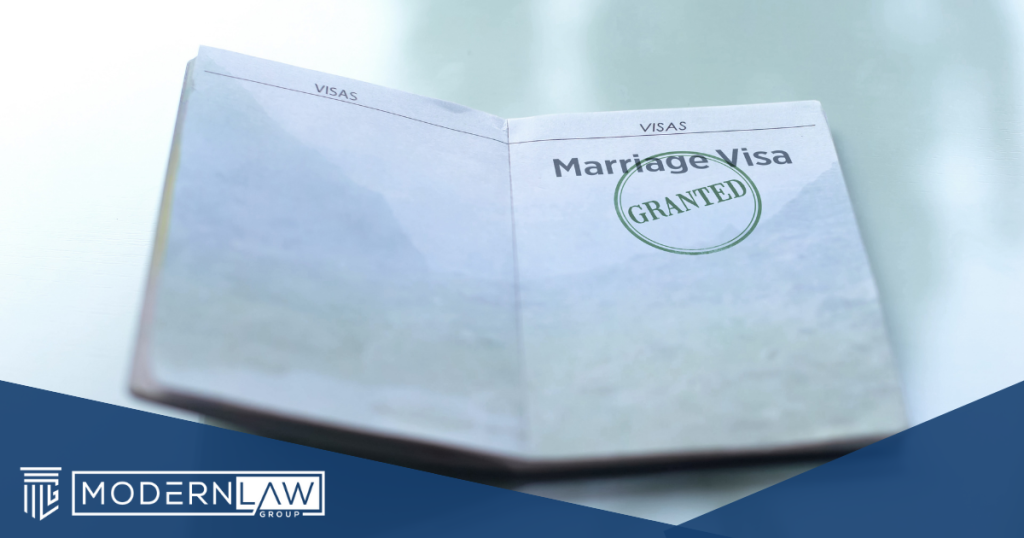Marriage Visas
Русский перевод
Traducción al Español
What is a Marriage Visa?

A marriage visa allows the spouse of an American citizen to travel to the United States and receive permanent residency. If your spouse is already in the U.S., you will not need a marriage visa, but to adjust your status to a green card holder.
A person who has lawful permanent resident status gets what’s called a green card – that’s the official form that denotes a person’s ability to live and work anywhere in the U.S. This guide explains marriage visas, how to get them and what they enable a person to do.
Who Qualifies for a Marriage Visa?
Marriage visas are available to U.S. citizens’ and lawful permanent residents’ foreign spouses, but both parties must meet certain criteria to qualify. The requirements are as follows:
- The sponsor must be a U.S. citizen or lawful permanent resident. There are two types of marriage visas: The CR-1 visa, which is available to spouses of U.S. citizens, and the F-2A spousal visa, which is available to spouses of lawful permanent residents. These two marriage visas are very similar, but the F-2A visa sometimes takes longer to process.
- You must be married. You can’t file for a marriage visa until after you’re married. (If you want to get married in the United States, a K-1 fiancé visa. is a better choice for you.)
- You must demonstrate that you’re able to financially support your spouse by meeting at least the federal poverty guidelines. However, if you don’t make enough money to qualify, you may be able to use a co-sponsor and show other assets.
- Your spouse must be eligible for an immigrant visa. If your spouse does not meet eligibility criteria, or if they violated U.S. immigration laws, the process becomes much more complicated – and your spouse may not be eligible to come to the United States.
CR-1 Visa Process
After you hire our marriage visa attorney Deron Smallcomb, you will be assigned to the caseworker most familiar with your spouse’s country and U.S. embassy there, and in many cases one that speaks the same language as your spouse. We will give you and your spouse access to our secure website where you can enter your basic biographical information and upload the documents we require.
After we have collected the needed information for your spouse visa, we will complete all of the forms and send them to a supervisor for review. We then send you the marriage visa forms for signature and review. You will sign them as instructed and return them to our office with the $535 filing fee for the U.S. Department of Homeland Security.
After we receive your forms, our legal team will compile your CR-1 visa petition on send it to the immigration attorney for review and signature. We then file your marriage visa petition with USCIS.
Marriage Visa Wait Times
The total CR-1 visa processing time, from start to finish, is 10 to 12 months. If you are a permanent resident filing for your husband of wife, the expected time is closer to 2 years.
The marriage visa wait times are broken down below:
- After we file your CR-1 petition with U.S. Citizenship and Immigration Services, or USCIS, you can expect about short wait of up to 3 weeks until you receive the receipt notice and case number.
- Within 5 to 8 months after receiving the receipt notice, you will ideally be receiving the approval notice from USCIS.
- USCIS then transfers your CR-1 petition to the National Visa Center, or NVC, for review of your financial and civil documents. Approval and transfer to the U.S. embassy in your spouse’s country may take up to 3 months.
- After the U.S. embassy receives your file, your spouse will need to schedule a medical exam and prepare for the interview.
- If the interview is successful, then your spouse will be issued a marriage visa.
- When your spouse enters the U.S., the visa serves as proof of your permanent residence. Within a month or two, your spouse will receive their green card.
The Spouse Visa Interview
After completing a medical exam, your spouse will have their interview at the U.S. embassy. The interview consists of the U.S. consular officer reviewing all of the documents we have prepared for you, as well as evidence that supports your relationship. The official assigned to your case will also ask questions about the legitimacy of your relationship.
Some of the questions the consular officer may ask include:
- How long have you been married?
- Who proposed – you or your spouse?
- Where and how did you two meet each other?
- Where did you marry? What was your wedding like?
- What are some of your spouse’s hobbies?
- What is your spouse’s religious background, and what is yours? Do you share the same beliefs?
- How much money did your spouse spend on their last trip to visit you?
- What are your spouse’s siblings’ names, and do they have any children?
- What types of activities do you and your spouse enjoy doing together?
- What’s your spouse’s favorite movie? Their favorite food? Their favorite musical artist or song?
The official asking these questions isn’t doing so to get into your personal life; they’re doing so to determine the validity of your marriage. That’s because some people only marry to obtain an immigration benefit, which is against U.S. immigration law – and the consular officer must determine whether your marriage is bona fide. A bona fide marriage is one in which the spouses intend to stay married forever and are not marrying simply so one can gain an immigration benefit.
Because this interview typically takes place at a U.S. embassy or consulate abroad, traveling may be cost-prohibitive or difficult. Although it doesn’t hurt for the U.S. citizen to attend this interview, it is not required.
Remember: This interview is a chance to give USCIS the evidence it needs to make an immigration decision. You must be honest and open – and you shouldn’t feel any pressure to act like you have a perfect marriage. Your interviewer may ask very personal questions, and if you find a question offensive, it’s okay to say so; most understand and will simply ask you the next question.
During your interview, your interviewer may also ask you questions to verify the information on your petition.
If the consular officer is satisfied with the answers to the CR-1 visa questions, the visa will be granted. It is typically received by your spouse within the 10 days following the spouse visa interview.
After CR-1 Spouse Visa Approval
After your spouse has their visa, they are free to travel to the United States. They must use their CR-1 visa within 6 months of it being issued. It expires after 6 months, which means your spouse may no longer use it to travel to the U.S. after that date.
The visa converts to a green card after your spouse uses it to come into the United States. USCIS will generally issue the green card within the months immediately following your spouse’s arrival. That green card will be conditional; you must file a petition with USCIS to remove the conditions before the green card expires.
At that time, you must prove to USCIS again that you’re in a bona fide marriage – that means your marriage is genuine and that you’re not married only so that your spouse can gain a standard green card, which is valid for 10 years, or naturalized citizenship, which lasts forever.
Don’t worry; every CR-1 visa and green card recipient receives this conditional green card; everyone has to reverify the facts about their marriage. And conditional permanent residents – those with initial green cards that have conditions attached to them – have the same rights and privileges as permanent residents do. That means your spouse’s conditional green card enables them to live and work anywhere in the United States.
How Long Does It Take to Approve a CR-1 Visa, and How Much Does It Cost?
Every country is different, but as a general consideration, most petitions have been taking between 9 and 18 months from the time of initial filing to the time of final approval at the U.S. embassy. It is often faster for those in the U.S. armed forces.
With regards to cost, the government and medical fees total about $1,500. However, that figure depends on your spouse’s country of origin. This cost is spread out during the process; it’s not due all at once. Our fee is very reasonable, depending on the circumstances of the case and how many family members will be immigrating to the United States. The best way to find out how long it will take for your spouse to receive a CR-1 visa and how much it will cost is to schedule a complimentary immigration consultation.
Schedule a Case Evaluation with an Immigration Professional Today
Any mistakes or errors in your marriage visa application could delay your spouse’s visa grant or even result in a denial. Working with an experience attorney ensures that your application receives no unnecessary delays. Call our office or fill out the form on our site to schedule a consultation today.









